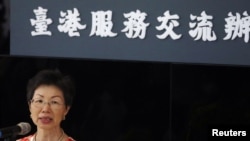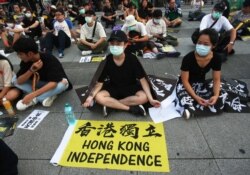Taiwan opened a government office this month to help Hong Kong citizens ask for legal residency on the island.
Hong Kong’s residents have protested over the past year against Chinese rule in the territory. Chinese lawmakers recently approved a security law for the former British colony.
Taiwan may offer a democratic system of government and a shelter for those fearing any Chinese oppression.
But it is hard to say if Hong Kongers are interested in moving to Taiwan. People who study interactions between the two sides say they do not expect large numbers of people will go.
China took control of Hong Kong from the British in 1997. Taiwan is self-ruled, although the mainland claims that it is part of China.
Most Hong Kongers who consider emigrating look not to Taiwan, but Western countries, where they can earn more money. Some residents also worry that there will be conflict in the future between Taiwan and China.
“Taiwan to them is like Hong Kong in the future,” said Shane Lee, a retired political science professor from Chang Jung Christian University in Taiwan. “They’re very leery about the future of Taiwan [if] maybe there was a war or something.”
Taiwan will receive some interest among the fearful in Hong Kong because the island is so close. It also has a lower cost of living and a Chinese culture similar to Hong Kong’s.
Yee Ming Tan moved from to Taiwan from Hong Kong 10 years ago. He now operates an executive coaching service on the island. He says businesspeople can do well in Taiwan because of lower operating costs, but it is important to have the right connections to help understand business rules.
Taiwan’s Investment Commission lists 1,760 investment projects from Hong Kong since it began keeping records in 1962. They are worth about $7.9 billion.
Wealthier people fleeing Hong Kong are more likely to go to Western countries than to Taiwan, notes Liu Yih-jiun, a professor at Fo Guang University in Taiwan. Those who left in 1997 went to Australia, Canada, or other Western countries. Costs of living are often higher in the West, but people generally earn more money.
Laborers from Hong Kong would get lower pay in Taiwan, compared to Hong Kong. Also, the newcomers would mostly speak only Hong Kong’s Cantonese and not Mandarin, the official Mandarin Chinese, experts warn.
“The only language they can communicate with people is Cantonese,” Liu said. “If the overseas workers want to compete [for] a job, these people will be heavily discriminated.”
Hong Kong retirees would consider Taiwan for its cost of living, but people who need money will look to other countries, adds Alex Chiang. He is an associate professor of international politics at National Chengchi University in Taipei.
“I think they’ll go to some place where they can make more money,” Chiang said.
Australia, Britain, and the United States have also sought ways to accept Hong Kong citizens as refugees because of Hong Kong's new security law.
China approved the law on June 30 to stop the protests that sometimes shook Hong Kong over the past year. The law criminalizes secession, subversion, terrorism, and aiding foreign forces. It is seen by many as a direct threat to Hong Kong’s democracy.
Taiwan’s service office offers Hong Kong residents humanitarian assistance, help finding work, or help setting up a business.
Last year, pro-democracy activists in Hong Kong asked Taiwanese legislators to consider an asylum law. Worried about its own security, Taiwan still examines requests for asylum cases one by one.
Slightly more than 5,000 people from Hong Kong emigrated to Taiwan last year, reported Taiwan’s government-supported Central News Agency. That is 40 percent more than in 2018.
I’m Susan Shand.
VOA’s Ralph Jennings reported this story. Susan Shand adapted it for Learning English. George Grow was the editor.
_______________________________________________________________
Words in This Story
residency – n. the place where one lives
emigrate – v. the decision to leave a country and live someplace else
leery – adj. afraid
executive – adj. a member of high management
coaching – n. teaching someone to be good at someone
secession – n. leaving a country






